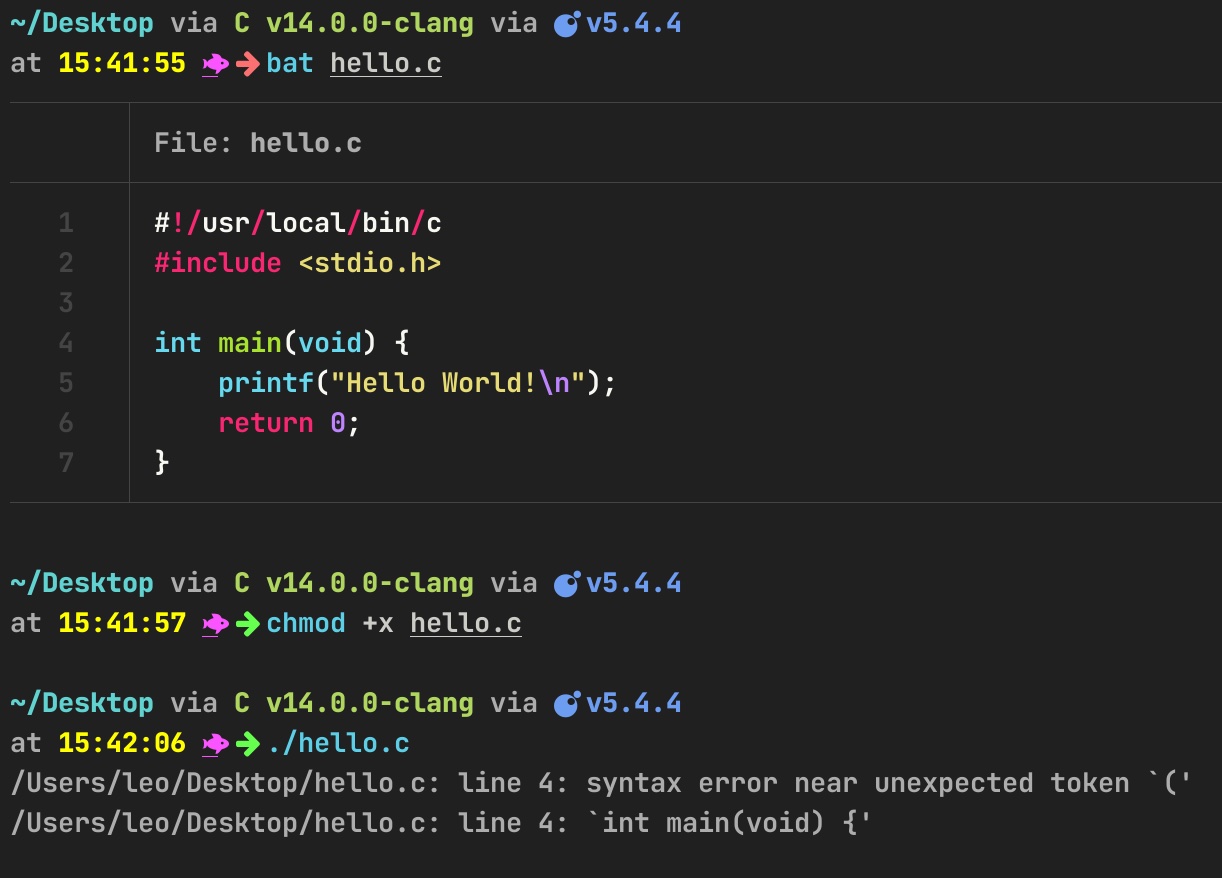"There isn't much that's special about C. That's one of the reasons why it's fast."
I love C for its raw speed (although it does have its drawbacks). We should all write more C.
With this shell script, you can compile and execute C "scripts" in one go!
(Oh yeah, and it works for C++ too.)
Here's a simple example:
#include <stdio.h>
int main(void) {
printf("Hello World!\n");
return 0;
}Run it by typing:
$ c hello.c
Hello World!Or, call it from the shebang!
#!/usr/bin/c
#include <stdio.h>
int main(void) {
printf("Hello World!\n");
return 0;
}$ chmod +x hello.c
$ ./hello.c
Hello World!Use a package manager? Check here.
For the entire system:
$ wget https://raw.githubusercontent.com/ryanmjacobs/c/master/c
$ sudo install -m 755 c /usr/bin/c
# Or... for systems that prefer /usr/local/bin (e.g. macOS)
$ sudo install -m 755 c /usr/local/bin/cFor your local user only:
$ wget https://raw.githubusercontent.com/ryanmjacobs/c/master/c
$ sudo install -Dm 755 c ~/.bin/c
$ echo 'PATH=$PATH:$HOME/.bin' >> ~/.bashrcNote: if you install it somewhere other than /usr/bin/c, then your shebang
will be different. For example it may be something more similar to
#!/home/ryan/.bin/c.
c will use whatever $CC is set to. You can change this with:
$ export CC=clang
$ export CC=tcc
$ # etc...Anything you want passed to the compiler, put in quotes as the first argument.
Whether they're flags (-Wall, -O2, etc.) or file names (file.c,
main.c, etc.).
$ c "main.c other.c" arg1 arg2
$ c "main.c other.c -O3 -Wall -lncurses" arg1 arg2With only one file, omit the quotes:
$ c hello.c
$ c main.c arg1 arg2After adding a shebang, just set the file to executable and it's ready to run.
$ chmod +x file.c
$ ./file.cAdd this to the top of your C file:
#!/usr/bin/cJust tack on any extra flags, options, or files you want passed to the compiler.
Then be sure to add the terminating -- characters.
#!/usr/bin/c file1.c file2.c -lncurses -lm --The default cache size is set to 5 MB. You can change this with:
$ export C_CACHE_SIZE=$((10*1024)) # 10 MBThe default cache path is set to $TMPDIR/c.cache. You can change this with:
$ export C_CACHE_PATH="/tmp/the_cache"You can clear the cache with the --clear-cache flag:
$ c --clear-cacheFeel free to submit any ideas, questions, or problems by reporting an issue. Or, if you're feeling a bit brave, submit a pull request. 😬
Just hack away and make sure that all the tests pass.
$ cd tests
$ ./test.shFirst of all, I want to clarify why this is not the same as tcc -run.
TCC is a compiler. We all know that. TCC will perform its own set of
optimizations, just as GCC will perform its own and Clang will perform its
own. The purpose of this script is to give a simple front-end to your favorite
compiler.
Whether it's GCC, Clang, or something else entirely, you get to choose your compiler.
Second reason: it's simply satisfying to type c hello.c and see it run instantly.
Third reason: I'm a fan of speed, and C definitely offers it. Being able to write a small, fast, and portable C "script" is great. You can pass around a C "script" just like you would a BASH script.
If you're using zsh, then you can take advantage of zsh's suffix aliases:
$ alias -s c='c'
$ alias -s cc='c'
$ alias -s cpp='c'Then you can run files with ./file.c without chmod +x.
Use a package manager? You've come to the right place.
AUR: https://aur.archlinux.org/packages/c/
bpkg: bpkg install ryanmjacobs/c
brew: brew install c
(shebang will be #!/usr/local/bin/c for Intel-based Macs or #!/opt/homebrew/bin/c for Apple Silicon)
Maybe later we can implement caching. Done!
Basically, you can do whatever you want provided that you include the LICENSE notice in any copy of the source. Also, I am not liable if the script breaks anything.


